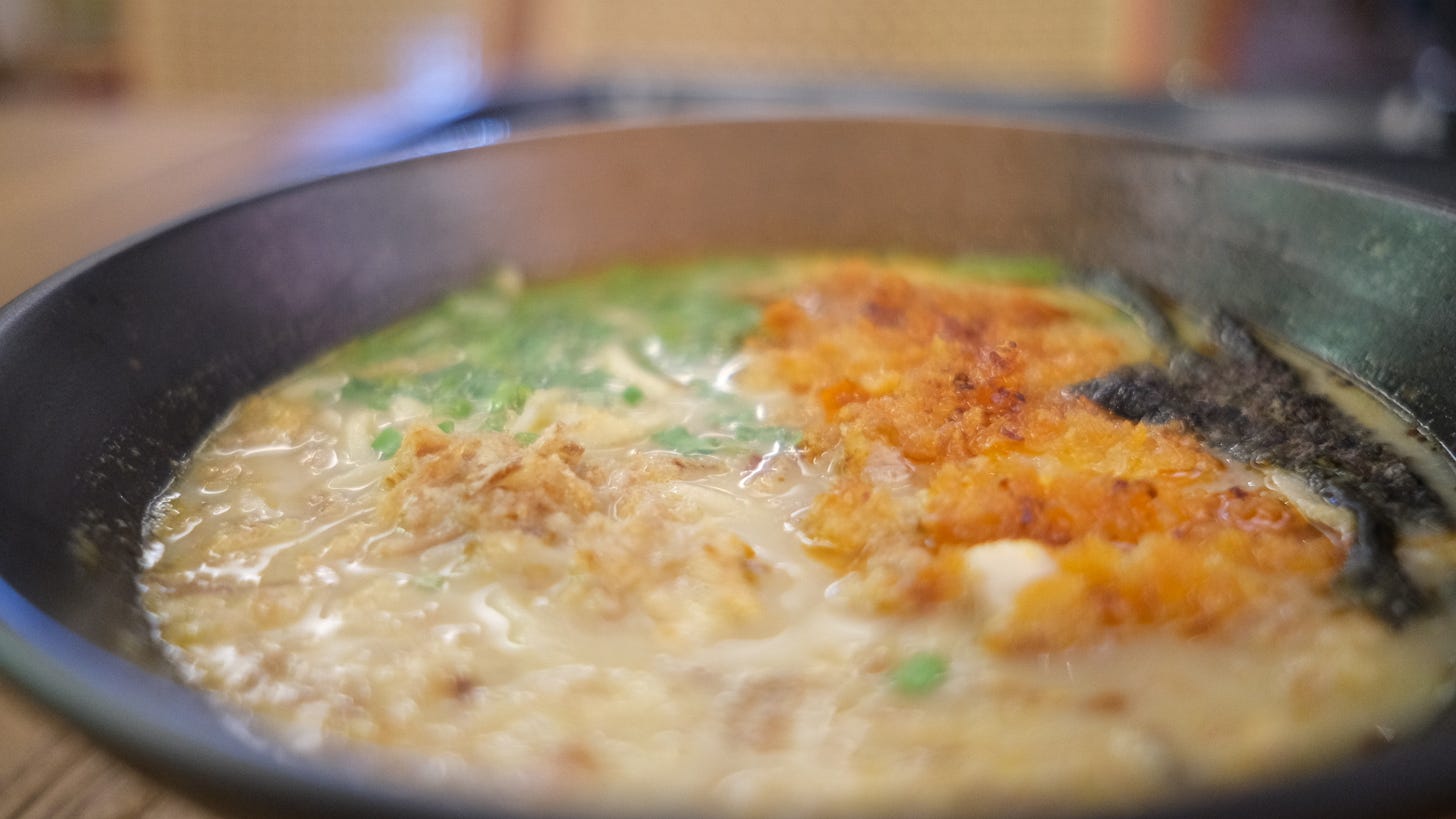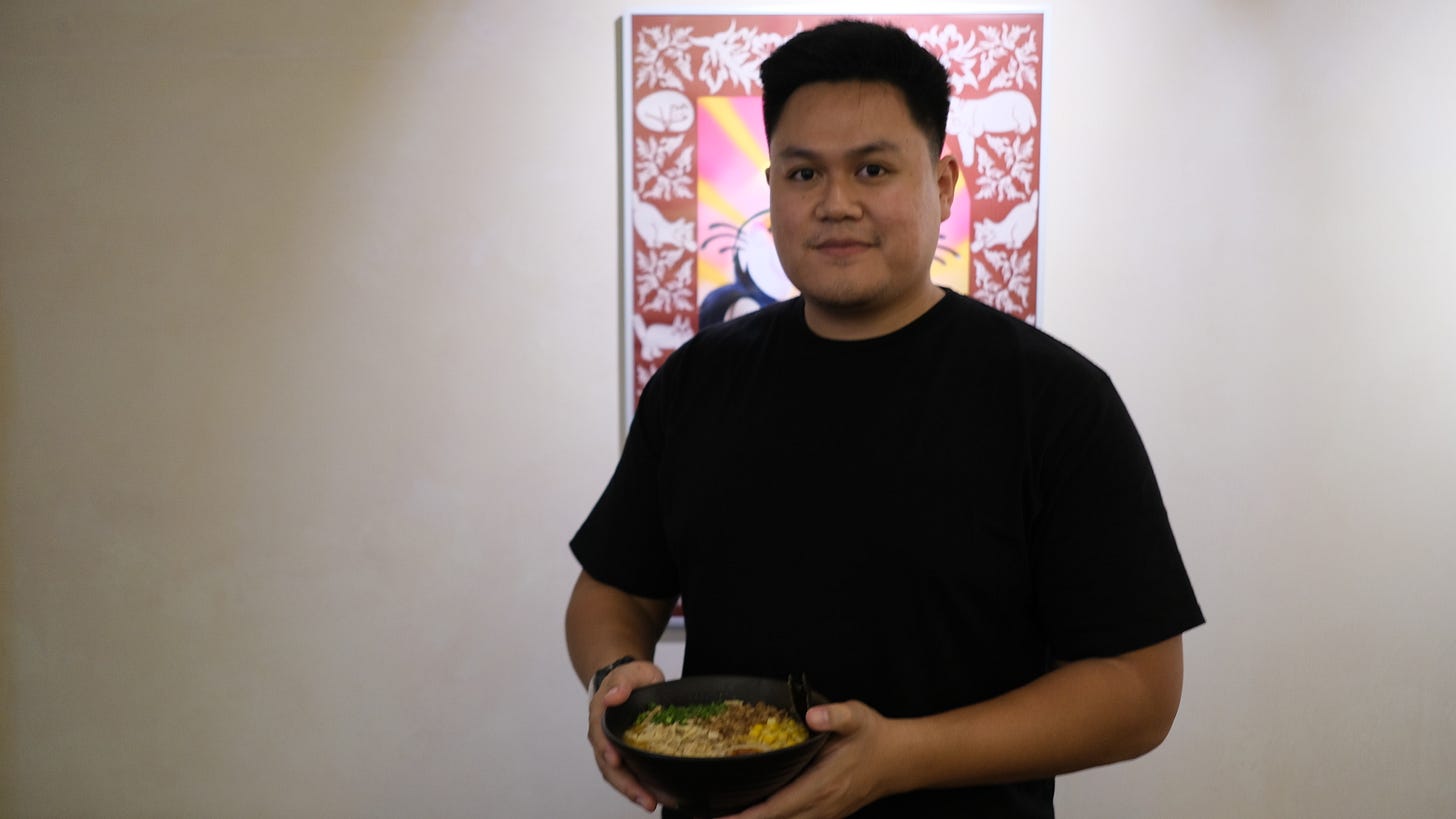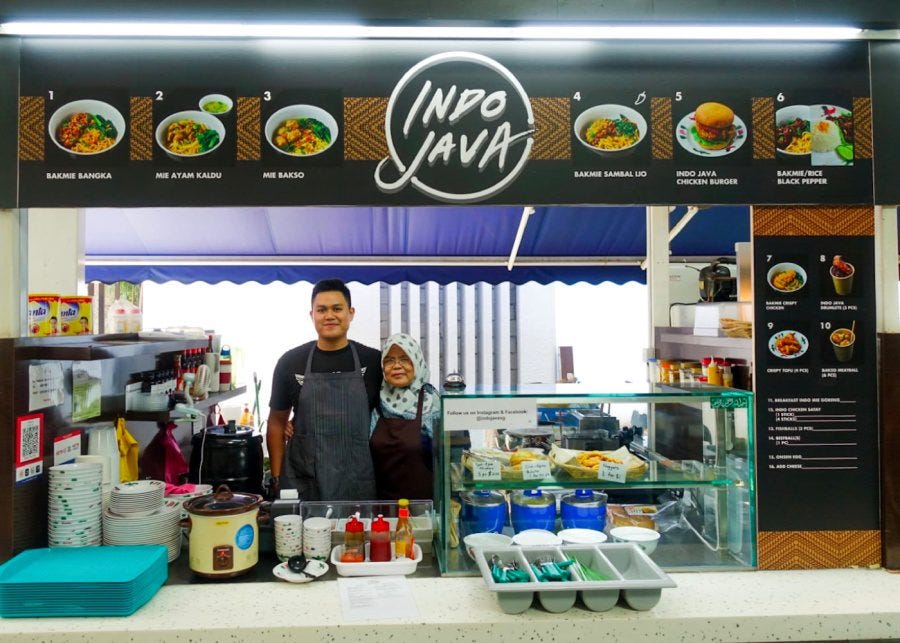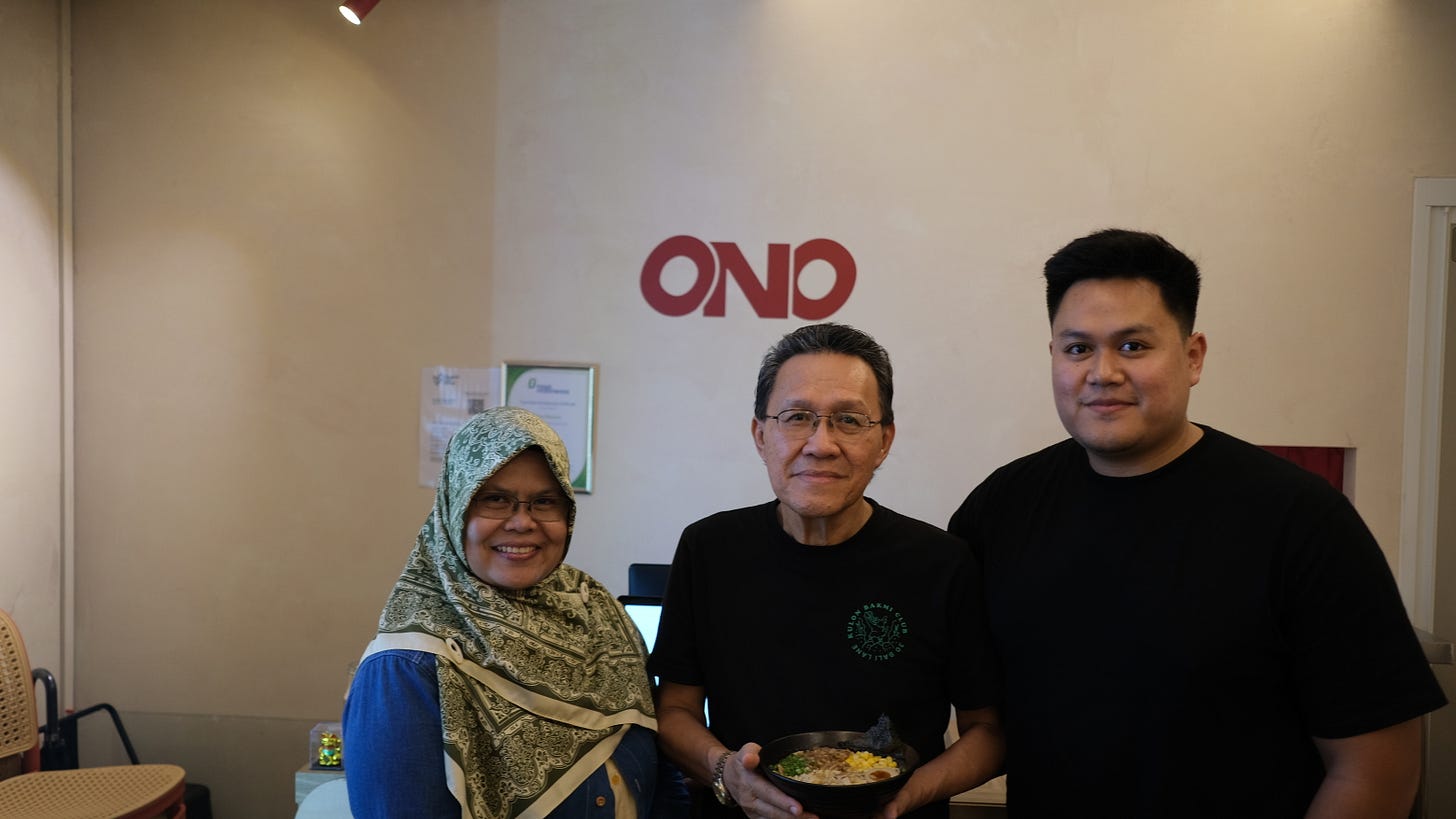Flavors of family
Ono Ramen’s bold ramen experiment, and how what family feuds say about authenticity.
If you want to go fast, go alone; if you want to go far, go together - but consider your company carefully.
The rejoinder comes from personal experience, and also the countless stories of founder fallouts.
Picking the wrong business partner can be especially painful if they’re family, as so many food family feuds reveal. But business is business, the stakes are high, and blood does not always run thicker than water.
But when family does come together to make it work, the result is magic. Across Southeast Asia, thousands of family-run food stalls continue to hawk their dishes today. Some have grown into household names, others into international brands.
Maybe Dominic Toretto says it best: family isn’t about blood, it’s about who’s willing to hold your hand when you need it.
Come what may, here’s wishing you and your family a harmonious 2025 😌
This week, we look at:
Tastemakers: Ono Ramen’s delectable Javanese-Japanese dishes
Hot Take: What family food feuds tell us about authenticity
Putting a Javanese spin on a Japanese favorite: Haris’s Ono Ramen
Good ramen relies on five key elements working in harmony: broth, tare, noodles, toppings, and oil. Of these, the broth is the foundation, revealing the ramen’s unique character most clearly.
In Ono Ramen’s bowls, the broth tells the story best: bright citrusy and sour notes regularly slice through its savory base, striking a masterful balance between classic Japanese techniques and rich Indonesian flavors. Layered within these flavors are spice blends borrowed from treasured family recipes, adding to the ramen’s distinct personality.
Launched in September 2024, Ono Ramen’s bold experiment infuses traditional Japanese ramen with an Indonesian twist, making them truly one of a kind. This novel reinterpretation of ramen is the culmination of director and co-founder Haris Ahmad’s seven-year culinary journey.
My first encounter with their Gulai chicken broth challenged my expectations, yet its creamy, savory profile quickly won me over. The Garang Asem bowl, my second try, showcased a more pronounced Indonesian influence—surprisingly delightful alongside toppings like fried shallots, spring onions, and nori seaweed.
Perhaps what makes this place stand out even more is how customers aren’t simply drawn by novelty. Each dish extends a warm invitation, and Ono Ramen’s strong sense of community keeps patrons coming back for more.
Where do these community vibes—or “kampong spirit,” as we call it in Singapore—come from? I wager it starts with Ahmad’s family. Every detail reflects their unique traits and talents—“Ono,” meaning “to have” in Javanese, is a nod to Ahmad’s mother from Semarang—and it all comes together seamlessly.
Here’s how Ahmad’s culinary experiments grew by leaps and bounds, his strategy behind his growing restaurant business, and how Ono Ramen intertwines family with passion.
Small steps in a big play
Ahmad’s journey into the culinary world began early.
During his childhood, he learned valuable cooking techniques by helping his mother in the kitchen. Visits to the market further expanded his knowledge of Indonesian staples, such as ginger and galangal.
These formative experiences likely fueled his dream of running a restaurant, but Ahmad had no formal experience in Singapore’s food and beverage scene. “So, the plan was to develop a concept in three phases, … starting with a stall for a year to keep experimentation costs low,” he recalled.
In August 2018, Ahmad took the leap. He dropped out of the Singapore Institute of Technology after one semester, secured a stall at Singapore Polytechnic with a friend’s assistance, and opened IndoJava—an Indonesian concept specializing in Bakmi (Indonesian dry noodles).
IndoJava’s success exceeded Ahmad’s expectations. “Business was so brisk that our landlord offered to extend our lease, but we decided to stick to our guns,” he said. Balancing a part-time business degree with IndoJava’s dinner service proved demanding, but Ahmad managed both.
After a year of experimentation, IndoJava closed in July 2020, and Ahmad launched KULON that same month.
This Phase 2 focused on refining what worked and discarding what didn’t. “We identified things to improve in terms of taste, smell, and texture,” Ahmad explained. KULON delivered elevated dishes with “improved aesthetics” and carefully chosen toppings that “addressed market needs,” while also expanding the menu based on customer feedback.
KULON also tackled challenges Ahmad had encountered with IndoJava—chief among them having to constantly introduce customers to Bakmi. By positioning itself as the pioneer of authentic Indonesian Bakmi in Singapore, KULON emphasized the dish’s origins, drawing customers in with its cultural roots as much as its flavors.
KULON also met with success, and Ahmad saw the signal to move on to the next phase, but manpower constraints made opening a new concept unfeasible. It would take Ahmad until 2024 to finally consider moving on to Phase 3.
That decision finally came in May 2024. Ono Ramen’s Indonesian-Japanese concept would push the boundaries of Ahmad’s culinary expertise, and put years of refinement to the test.
The novelty of Ono Ramen’s dishes meet a currently underserved gap in Singapore’s culinary scene, but it also re-introduced the challenge of growing customer awareness. “It’s like going through the whole IndoJava experience again,” Ahmad chuckled.
Moving the needle is never easy, but Ono Ramen appears to be doing just that: as of December 2024, 60% to 70% of its customers are return customers; Ono Ramen’s bowls are priced similarly to regular offerings, and the restaurant’s profit margin has been growing since launch, though Ahmad declined to provide exact figures.
There was, however, a noticeable slowdown in customers over Ono Ramen’s third and fourth months in business, though Ahmad attributes this to seasonality. “December, traditionally, is a low month for food and beverage businesses [in Singapore],” he observed.
Ultimately, Ahmad is sanguine about Ono Ramen’s prospects. “It’s a test of patience, like planting a seed, and painstakingly making sure that it grows well,” he added.
Systems thinking
Nurturing a new venture can feel like a gamble, but Ahmad knew KULON would only thrive with scalable systems in place.
“This was our first physical store, and we needed time to understand Singapore’s F&B landscape,” he explained. That meant carefully assessing kitchen facilities, streamlining food preparation workflows, and establishing clear customer service protocols.
These processes were put to the test under the initial COVID-19 measures introduced by the Singapore government. Yet despite pandemic-related challenges, KULON not only weathered the storm but also turned a consistent profit between 2020 and 2022.
These battle-tested strategies provided Ono Ramen with a robust foundation. “We have complete standard operating procedures (SOP) that staff rely on, which allows me to leave the restaurant on autopilot,” Ahmad noted. These SOPs also ensured flavor consistency, and provided instructions on training every staff on the soup preparation process.
These guidelines were critical to Ono Ramen’s success, given that rempah paste, which gives each bowl its distinct Indonesian flavor, and the base soup are made in-house. Both require several hours of painstaking preparation.
Beyond SOPs, hard-won lessons running IndoJava and KULON also refined Ahmad’s cost management, profit forecasting, and project planning approaches.
Ahmad’s deep familiarity with Indonesian flavors accelerated Ono Ramen’s R&D phase to just three months. Because he and his family already knew the base flavors so well, Ahmad could devote his efforts entirely to perfecting the ramen concept.
KULON and Ono Ramen also now support each other in terms of staff training and ingredient sourcing.
“Since certain ingredients can be used at both restaurants, ordering them in bulk also lowered their cost,” noted Ahmad.
Ono also currently doubles as a central kitchen that delivers vacuum-packed bags of spices and ingredients to KULON. Ahmad credits this idea to conversations with veteran restaurateurs among the Rasa Indonesia business community, and specifically mentioned prominent multi-generational restaurant Rumah Makan Minang as a close advisor and “great source of information and operational knowledge.”
Still, there are some challenges that even robust systems can’t entirely resolve. “Manpower is an issue you can never truly fix,” Ahmad admitted. “It’s an ongoing problem that only ever finds temporary solutions.”
For now, Ono Ramen prioritizes staff retention by supporting team welfare and maintaining open communication channels. Some employees have even stayed with the brand for three to four years.
Chasing the dream with a dream team
Ahmad had another advantage: his family, who supported his vision from the start, pitched in their strengths to grow the business.
Today, they all remain actively involved in Ono Ramen. Ahmad’s father, a retiree, works the counter as one of the restaurant’s waiters. His mother, the mastermind behind Ono Ramen’s secret recipes, is in the kitchen preparing delicious bowls of ramen alongside Ahmad and the kitchen staff. Although Ahmad’s sister doesn’t work at Ono Ramen, her graphic designs, blending Indonesian and Japanese motifs, decorate the otherwise plain walls.
Working with family brings its own set of challenges, but Ahmad’s experience has been smooth-sailing so far. “There’s no friction at all, working together all the time,” he recalled. He added that his parents could choose not to participate, yet they still regularly drop by to help.
“Everyone always had a mature mindset from the start, and we all understand that there are goals to meet,” Ahmad said. “When conflicts arise, we handle them like a business and resolve them professionally.”
Ahmad also credits part of his culinary success to his parents’ unwavering support - and their receptiveness to trying new things. With Ono Ramen’s experiment just beginning, that mindset is a winning factor in Ahmad’s playbook.
When asked about his next move, Ahmad is focusing solely on Ono Ramen. “We already have a few offers to expand the restaurant, but we want to carefully manage our current processes, so there’s no rush,” he said. For now, everything is working in harmony at Ono Ramen.
Food family rivalries: when flavors diverge, is there still a “real deal”?
Does “original” really taste better? It’s a somewhat moot question, but reality TV shows like Food Wars, Food Feuds, and their global counterparts have repeatedly explored this by pitting contenders for the culinary throne against one another.
The frustration of proud proprietors and the ensuing chaos provide ample entertainment value; at the end of each episode, a verdict is reached, and a “clear” winner emerges.
These showdowns aren’t purely about chest-thumping. As the long-standing feuds covered in Singaporean docuseries On the Red Dot: Food Feud (ORD) often reveal, it’s also about authenticity - “getting history right” - and branding.
What made the showdowns on ORD stand out even more was that they stemmed from conflicts between family members or former coworkers. Consequently, the competitors were—or still are—selling dishes based on the same original recipe.
One episode, in particular, stood out to me. When asked about his early days helping at his father’s Teochew pork noodle stall with his brothers, Mr. Tang Chay Seng, the proud owner of Singapore’s Michelin-starred Hill Street Tai Hwa Pork Noodles, recalled that signboards were nonexistent during his father’s time.
Ergo, people didn’t care about the stall’s name; they flocked to it because the noodles tasted better than anywhere else.
But we’re not in the 1950s anymore, and we all recognize how powerful branding can shape food experiences.
Consider this: if competitors who came from the same source are labelled inauthentic for making changes, how can the original be considered authentic when it also tweaks the initial recipe?
In this case, the authenticity of the dish isn’t substantive - it doesn’t have any basis in reality since the original stall no longer follows its original recipe. It’s simply performative, and plays on the premium that consumers place on brands when they recognize them as genuine.
The higher that premium, the more important protecting that “authenticity” becomes. In the Tai Hwa Pork Noodle feud, things came to a head in 2010 when Tang Chay Seng sued his nephew for trademark infringement. Tang had actually consented to his nephew’s use of the name “大華” - the likely crux of the problem, as the presiding judge found, was that his nephew misused Tang’s awards to promote his stall.
So, while the original might not always taste better, being the “real deal” is, well, a real deal. Flavors come and go, but a brand etched in history endures a little longer.










